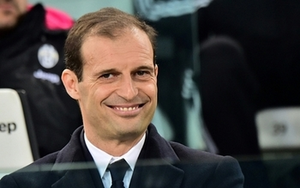While much of Italy now regards Juve as the killjoys of Napoli’s stirring, romantic reach for the top, Allegri’s achievement in recovering what had been a shambles of a campaign adds, every week, to his cachet.
“We were 12th in the table only three months ago,” Allegri reminded anybody who might have missed how steep a gradient Juve have climbed since they lost to Sassuolo at the end of October. Then, they had 12 points from 10 games. No club has ever finished top from such a low start.
Simone Zaza’s spectacular, if lightly deflected, goal two minutes from time, extended Juventus’s run of successive league victories to 15, and put a bold full-stop to a sequence of eight Napoli wins. They leapfrogged their opponents, whose coach, Sarri – who gave up bonds and gilts only after he turned 30, and first worked in Serie A just 18 months ago, with Empoli – said: “Anybody who had been watching the first 88 minutes would not have predicted the outcome.”
Not much argument there, and no temper, thankfully, from Sarri, who last month was fined for uttering abusive, homophobic insults during a touchline spat with the Internazionale coach, Roberto Mancini.
The trouble for Napoli, and the other 18 clubs in a Serie A held for the last four seasons by Juventus, is that Juve are experts at gaining points from matches which for 80-odd minutes look tight. They had the habit under Allegri’s, predecessor, Antonio Conte, and after Allegri was taken on in the summer of 2014, he maintained the robust, determined character of modern Juventus, as well as piercing a glass ceiling in the Champions League. Allegri guided Juventus to the final, where they lost 2-1 to Barcelona in June.
The tougher task was then to reshape Juve after senior players like Carlos Tevez, Andrea Pirlo and Arturo Vidal left. Of Allegri, much would be learned though the transition.
He already had a fame as an astute man-manager, approachable, patient, because of his work with Milan, where the president, Silvio Berlusconi appointed him with some beaming remarks about his photogenic looks, and set him the puzzle of fitting together assorted mavericks: Zlatan Ibrahimovic, Antonio Cassano, Robinho and Kevin-Prince Boateng were there; then Mario Balotelli turned up.
Berlusconi waved off Allegri after he had followed up Milan’s 2011 scudetto with silver and bronze behind Conte’s Juve. Milan have finished eighth and 10th since Allegri’s departure.
Plunging down the table with Juventus’s defending champions last autumn represented an even more startling decline, and Allegri was in charge of it. His decisions were being questioned. He seemed reluctant to look in the most obvious place for his next Tevez, to give the expensive, young striker, Paulo Dybala, a senior role. The longer view, with Juventus on top of the table, is that Dybala, now 22 and the club’s leading scorer this season, was being eased in gradually, to be all the more productive once Juve moved from crisis to what may be another coronation.

Ahead of the Napoli game, Allegri talked up the psychological advantage of Juventus’s experience in closing in on the main prize; Napoli lack that. His plans to contain Sarri’s free-scoring front players, particularly the prolific Gonzalo Higuaín, had been compromised by injuries to the totemic defenders Giorgio Chiellini, and, for most of the second half, Leo Bonucci. Juve still kept a clean sheet.
Zaza then joined a long line of substitutes Allegri has brought on to telling effect: the striker, introduced early in the second half, invigorated Juve’s attack even before his venomous long-distance shot removed Napoli from first place. “We are top, so that makes us title favourites,” Allegri said, coolly, after the triumph.
Sarri, the ex-banker, weighed up the numbers: The gap is just one point, but the momentum is Juve’s.
- Telegraph